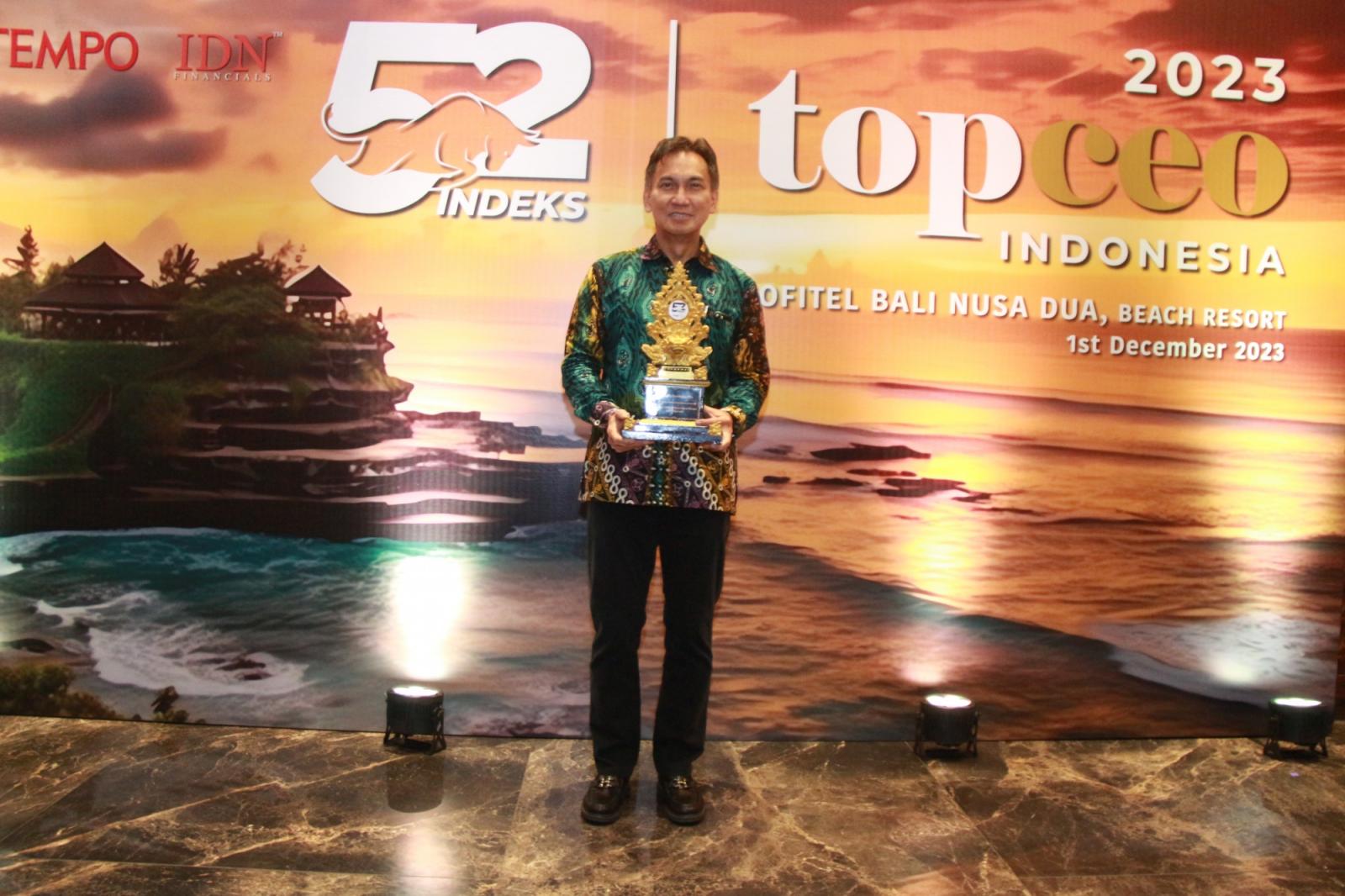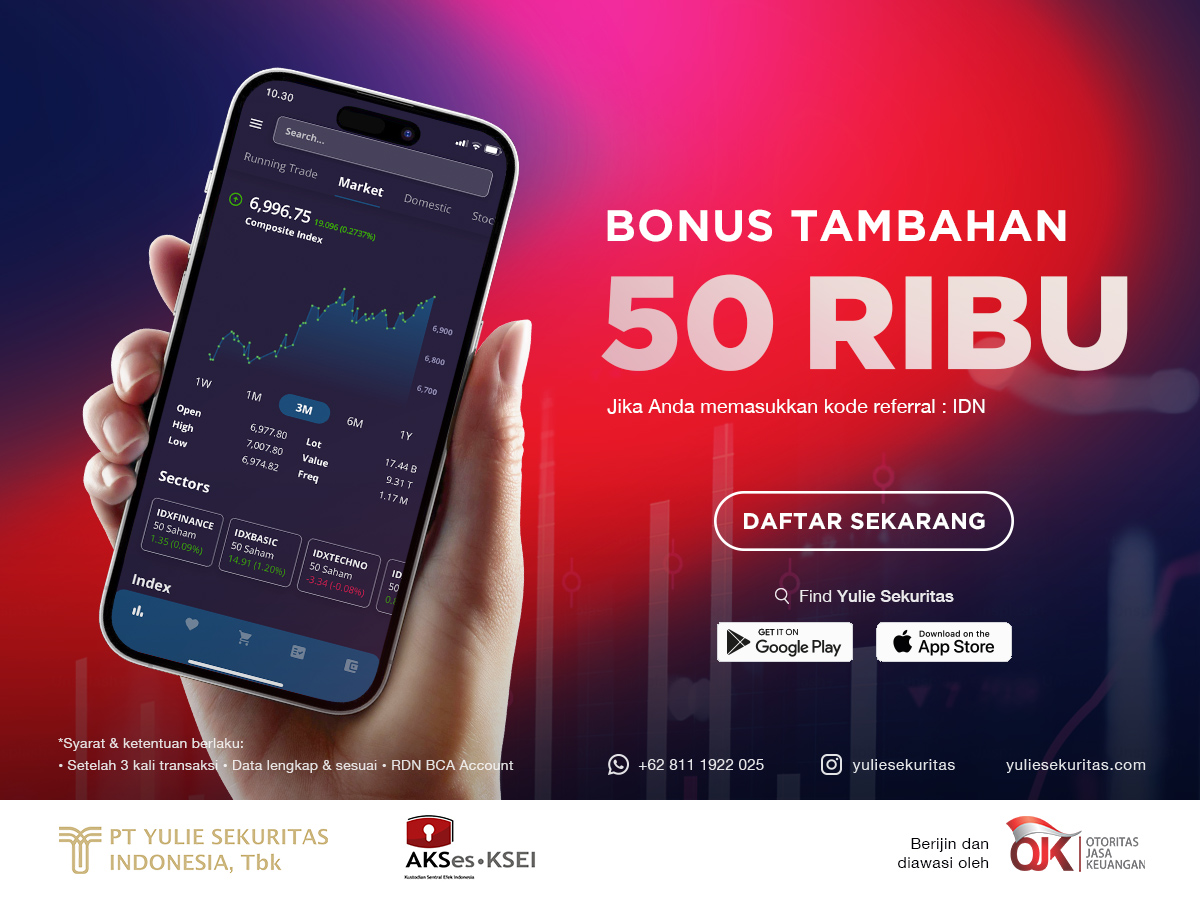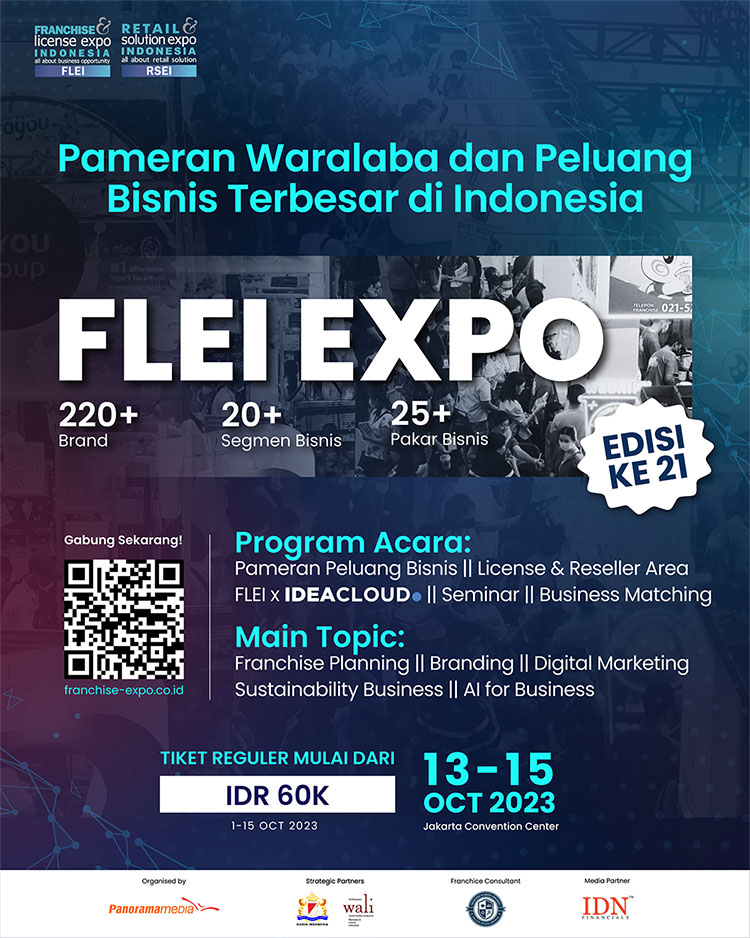Nicolas D. Kanter: We aim for legacy in EV battery ecosystem

NUSA DU – Tempo-IDNFinancials names Nicolas D. Kanter, CEO of PT Aneka Tambang Tbk (ANTM), as the Best CEO In Diversified Metals and Minerals during the TOP CEO Awards 2023 at Sofitel Hotel, Nusa Dua, Bali, last Friday (1/12). This appreciation is awarded for his contribution in leading Antam’s performance growth and implementation of ESG (Environment, Social, Governance) principles.
In relation to this event, IDNFinancials sat down with Kanter for an interview. Below is the interview.
Q. Antam has booked impressive performance growth since the pandemic up until today. Can you explain more about that?
A. If we take a look back to the pandemic, the primary focus, the one we implemented in Antam is our focus on health of employees. That is the priority, so we—consistently, we actually implement the protocols. So, whether it was in the office, our factories, in remote areas, we implemented that consistently and very rigorously. That is the first one.
The second is, If I reflect back on why we could survive, it goes back to cost leadership. In any situation, if we could maintain this cost leadership—meaning that we have to maintain the costs as effective and efficient as possible, which we implemented. Because, without a robust cost leadership initiative, we will not be able to survive. But, once again, as I said before, cost should not be all deemed as expenditures, or spending, because in relation to health—even when the protocols are costly, we should make it the main focus of the company. Therefore, we could reduce the number of infected people, and praise to God, we did not have what’s called an outbreak in our operation. In our operation, there is no pandemic case outbreak. That was what kept us surviving through the pandemic.
Furthermore, we surely initiated downstream process, adding value. So, our existing product—smelter—we now build it also in Haltim. We also maintain our operational excellence. Best mining practice is a must. Not just because we lower the cost, we sacrifice best mining practices. We still keep it going. So, operational excellence should always be our benchmark that we maintain in each unit’s KPI.
Possibly, we were assisted with our luck in having diversified product streams. Our products are not only nickel, we have bauxite and gold, as well. So, there are certain periods in which nickel price dropped, but gold took over to assist us in generating our revenue. Bauxite, too. We used to be able to maintain them as there was no export ban. We may choose to export or allocate them to domestic consumers. Those are, I think, the things that allow us to survive the pandemic.
Q. In the downstreaming sector, what you have implemented, would you say it works out?
A. At that time, there was indeed a delay in Feni Haltim project. But since the beginning, Antam has initiated downstream process. It is not only a thing promoted by the government. We all know that, actually, the added value in the process is the thing that generate the biggest revenue for us. So, we work on Feni Haltim. For bauxite, we also have ICA. Although we struggle with the cost, because we split it with our JV partner, but they all perform.
In the future, we all believe—we wish for this existing legacy, the EV battery ecosystem, we should enter is territory. Because, if we only thrive in upstream, and the downstream is stuck at smelting plant, it will not be enough, because we all aim for energy transition. So, we will enter EV battery industry. Even though we struggle, we actually push our partner to work.
Our partners are the biggest EV battery producer in the world. CATL is the biggest EV battery producer in the world. Our partner for the second JV is LGES; they’re the second biggest. So, as far as partners, we actually aim for the right strategic partners.
However, I have to admit, with humility, Antam is state-owned enterprise (SOE). So, in terms of delivering projects, we are not good—we don’t have the track record. We work so that Feni Haltim could produce 13,500 tons of nickel. We initiated the first metal tapping on September 12. But we should be on the lookout, we try to be more efficient in our costs as ferronickel price continues to drop.
For downstream, I believe that it is a must. I wish for Antam to enter EV industry; it is a must. It is such a long process. When I first got into Antam, they have only signed the MoU, but there was no movement at all. Everybody in Antam, the thing that I wish to change is the mindset of fear of making decision. The culture is still very obedient and restrained, because “it is better not to make any decision than make a decision, because you can be wrong and criminalised for that.” However, as I come from a multinational company, I have to keep being reminded. But, I believe, if we are transparent, and we are not actually gaining any interest from that, we should make it happen. This is something that we should balance. Thankfully, there are my friends in risk committee. But I would say if it continued like this, we will not be able to move forward.
Q. What are the strategies prepared to anticipate similar situation in the future?
A. In my opinion, firstly, we have to pray so that it does not happen again. But actually, if pandemic did come again, or even a drastic change took place, what should you prepare? In my view, the strategy that we had implemented in the past, we should still focus on that. Keep the focus on employees, because people are actually the ones running the organisation, both in the office or at site. So, we have to focus on the people. So, if it’s still related to the pandemic, health, well, the focus still has to be the health of employees.
The cost is expensive, but if we’re so robust in implementing cost containment initiative, creating efficient cost, we should be able to survive in any situations.
However, the key is how change is actually constant, inevitable. The only way to deal with change is to prepare, because—we usually grumbled by ourselves, victimised ourselves, that mentality, “well, it is what it is, we give up,” we cannot use that. We have to prepare ourselves. That mindset, something I actually struggle to see, is that the mindset of people at BUMN is very much bureaucratic. So, there is this irrevocable obedience to superiors. But you have to be able to say no, should be challenged. That mindset, the culture, in which we cannot refuse or deny the request, that is where the mess lies. We, as a leader, might not always know everything, especially when there are a lot of people that know better than us. How could we change this?
Transforming culture, people said, takes years. But I have to have faith that the culture change will happen, within my capacity and my time limit. I will not be here forever. It’s not that I give up, but if we don’t have the faith that the change of culture will take place, we will feel resigned. On the other hand, if we maintain the mindset, “we will make it happen,” from our closest people, at first, we could do this. That is why I change even the BoD, the office environment. Modifying this environment, it actually takes guts. That mindset is the one needing a change, so that a collaborative synergy could take place. If not, people will always ask for guidance, in a top-down approach. If we use top-down approach, it is only limited to the people within the BoD.
So, we try making some preparations, how to prepare. The only way to deal with change is preparing ourselves for the changes. So, once again we will continue to focus to the people, the employees, in terms of their health, even their well-being, which we are trying to improve. There are a ton of agenda that needs transformation, but every journey starts with one step. So, we try to modify the remuneration, the stock options. ESOP and MSOP are great alternatives, but let’s say, we are going to change this remuneration, it changes the whole agreement. So, you can’t change that.
Praise to God, it went on for only two years. The first year, they started to see that we actually do the work. If we’re talking about integrity, it is always the most important thing, for me, personally. It is something—because trust is earned. Trust is not given because I’m the CEO of the company; I have to earn that. How do you earn trust? It is by actually saying and doing the right thing. And, you walk the talk; show what you have been talking about. This is what we’re trying to slowly change. Yesterday, at last, the union, the one that is used to firmly oppose us, finally agreed.
We have to create a concept that—we are used to endure everything together; all of them, whether they perform well or not, they will also be granted the benefits. Now, we have to start eliminating this, so you actually see the pay-performance concept being applied. If you perform, yes, you get bonus. If you don’t, you get zero. But it takes a lot of effort.
All in all, that is what we’re trying to do. Hopefully, there are no more pandemic, but we still have to implement the focus on employees, health, and cost leadership, even better if we could deliver our JV for the EV battery.
Q. You mentioned integrity as a leadership character. Will you please elaborate on that?
A. For me, integrity is not only about not violating the code of conduct or conflict of interest; it doesn’t stop there. Those are a must, but integrity is saying and doing the right thing without having people looking at you, it is attributed to us. There is no right time to say the wrong thing, and there is no wrong time to say and do the right thing. What I’m trying to apply here, as a leader, you have to actually—all the time—stick to saying and doing the right thing. Do not let fear prevent you from saying and doing the right thing; we are often afraid of calling out something, but when we stood by, that is also wrong. My late father always reminded me of that. “Don’t do that, follow your conscience.” Jadi, when you actually have that and, you mould that into your value system, it becomes a brand: “if he said so, he will say the right thing. He has no agenda; he will not humiliate others.” It is not that I’m saying that to impress people. Instead, sometimes, we have to take the risk of going against, probably, majority of those in the room.
But if you have and continue doing and saying the right thing, you are not ever going to be afraid of doing that. People may be angered, but in its delivery, we always pay attention to humanity. We should still maintain the ethics. I was born and raised in Indonesia, but that system, the culture of respecting elders, should be maintained. However, if due to this value, then we have to respect elders with wrong sayings, that should not be right, as well. If there is someone that did not call me out when I made mistakes, said person is guilty, as well.
If someone asked me, how can I arrive at BP, then Vale? I would say it is because of trust. It’s not that I’m smart; I’m not technically and financially sound. So, trust is not earned by saying only what people want to hear. Sometimes, you have to say the things they do not want to hear, but in the end, the brand will stick when you consistently do the same thing over and over and over again.
Q. How is the implementation of ESG in Antam?
A. Now, regarding ESG, it is not only a trend. In my opinion, we have to internalise that culture, that mindset. Yesterday, I made a team; we have to have a message clear enough for employees, because mining—you cannot say mining is not actually digging and damaging the environment, but how do we do that in such a way, yet still respecting environment, community where we operate.
So, ESG is a must, because now, if we’re talking about energy transition, we will not have any customers. The US, or European, will not consider us, even when we have adequate resources, and as people said, “those who will survive are those who actually have the resources.” We have the resources, but we cannot manage it while complying with ESG. In the end, we will not be able to capture the market. So, ESG, for us, is a must.
So, we join IMCM, then we request consultants to assist us in assessing—actually, ESG has its SDGs, consisting of 17 items, a lot. But we start with something small, for example, human rights. We don’t need to cover extensive topic. We can actually ask what is our mechanism for whistleblowing or complaints? If we follow those up rigorously, it has opened our mindset.
Vale is considered to be good, as its environmental aspect is quite sufficient. I learned a lot from BP. Non-technical risk of BP is the biggest risk acknowledged by BP Corporation; it is not about technical risk. They ask for an independent panel reporting directly to the Group CEO in London, not even units. The panel come annually, twice, and they talk directly to regulators and communities where they operate.
That’s what could differentiate a company, and Antam, to be honest, we’re still in journey to actually get to that point. We are now completing a project. So, we have decarbonisation agenda, there are so many agendas to be carried out; changes like solar panel utilisation, B40, from the previous diesel. There are small steps, until electricity utilisation in Pomalaa, which we still utilise diesel, and we’re now changing it to hydropower-based electricity generation.
So, this is a journey; we’re not there yet, I have to be honest. So, we will get there, because it is the agenda, and everyone, when we talk in other countries, they ask, “what about your ESG, SDG?” Net zero emission is 2060. Sometimes, we could have an agenda until 2030. However, don’t do that; we actually have to create a line-of-sight measurable within 1-2 years, then the 2030 agenda. If not, this will just be in the clouds. So, we have to admit that that is something that we’re working on, and hopefully, we will be able to.
Q. How’s the progress of Haltim ferronickel plant?
A. In relation to Haltim ferronickel plant, many must wonder; well, it’s a long overdue project. However, it’s not that I’m defending previous management, but there were too many hands in the pot. When we talk about this project, SOE—well, we know about SOE—all of them feel they have their own stakes; becoming too political. So, in the end, the electricity never went in. After the previous final dispute, the smelter has been erected; a dispute with WIKA, which took a long time.
Yesterday, we and PLN have—actually, we have designed 2 stages. PLN will provide electricity for three years. But in the fourth year—because we thought that CATL has projects in the same area. So, we talk to their CEO, “you build this power plant, then we will utilise it in the fourth years onwards.”
Yesterday, starting from September 12, there had been the first metal tapping. However, we are still reviewing the cost over and over again, because we have this cash cow, but the ferronickel price continues to drop. I went to LME, and there are no one predicting how ferronickel price is going to see a brighter day. If being asked about the project, it has been established, but the monitoring and the review continue to take place. (LK/ZH)

